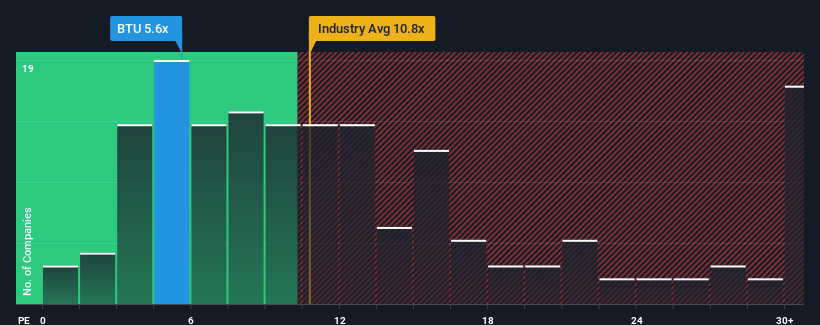- United States
- /
- Oil and Gas
- /
- NYSE:BTU
There's No Escaping Peabody Energy Corporation's (NYSE:BTU) Muted Earnings

When close to half the companies in the United States have price-to-earnings ratios (or "P/E's") above 18x, you may consider Peabody Energy Corporation (NYSE:BTU) as a highly attractive investment with its 5.6x P/E ratio. Although, it's not wise to just take the P/E at face value as there may be an explanation why it's so limited.
Recent times haven't been advantageous for Peabody Energy as its earnings have been falling quicker than most other companies. It seems that many are expecting the dismal earnings performance to persist, which has repressed the P/E. If you still like the company, you'd want its earnings trajectory to turn around before making any decisions. If not, then existing shareholders will probably struggle to get excited about the future direction of the share price.
View our latest analysis for Peabody Energy

How Is Peabody Energy's Growth Trending?
There's an inherent assumption that a company should far underperform the market for P/E ratios like Peabody Energy's to be considered reasonable.
Retrospectively, the last year delivered a frustrating 66% decrease to the company's bottom line. At least EPS has managed not to go completely backwards from three years ago in aggregate, thanks to the earlier period of growth. Therefore, it's fair to say that earnings growth has been inconsistent recently for the company.
Turning to the outlook, the next three years should bring diminished returns, with earnings decreasing 11% per year as estimated by the four analysts watching the company. Meanwhile, the broader market is forecast to expand by 10% per year, which paints a poor picture.
In light of this, it's understandable that Peabody Energy's P/E would sit below the majority of other companies. However, shrinking earnings are unlikely to lead to a stable P/E over the longer term. There's potential for the P/E to fall to even lower levels if the company doesn't improve its profitability.
What We Can Learn From Peabody Energy's P/E?
Typically, we'd caution against reading too much into price-to-earnings ratios when settling on investment decisions, though it can reveal plenty about what other market participants think about the company.
We've established that Peabody Energy maintains its low P/E on the weakness of its forecast for sliding earnings, as expected. At this stage investors feel the potential for an improvement in earnings isn't great enough to justify a higher P/E ratio. It's hard to see the share price rising strongly in the near future under these circumstances.
We don't want to rain on the parade too much, but we did also find 3 warning signs for Peabody Energy (1 makes us a bit uncomfortable!) that you need to be mindful of.
If P/E ratios interest you, you may wish to see this free collection of other companies with strong earnings growth and low P/E ratios.
New: Manage All Your Stock Portfolios in One Place
We've created the ultimate portfolio companion for stock investors, and it's free.
• Connect an unlimited number of Portfolios and see your total in one currency
• Be alerted to new Warning Signs or Risks via email or mobile
• Track the Fair Value of your stocks
Have feedback on this article? Concerned about the content? Get in touch with us directly. Alternatively, email editorial-team (at) simplywallst.com.
This article by Simply Wall St is general in nature. We provide commentary based on historical data and analyst forecasts only using an unbiased methodology and our articles are not intended to be financial advice. It does not constitute a recommendation to buy or sell any stock, and does not take account of your objectives, or your financial situation. We aim to bring you long-term focused analysis driven by fundamental data. Note that our analysis may not factor in the latest price-sensitive company announcements or qualitative material. Simply Wall St has no position in any stocks mentioned.
About NYSE:BTU
Peabody Energy
Engages in coal mining business in the United States, Japan, Taiwan, Australia, India, Brazil, Belgium, Chile, France, Indonesia, China, Vietnam, South Korea, Germany, and internationally.
Very undervalued with flawless balance sheet.
Similar Companies
Market Insights
Community Narratives



